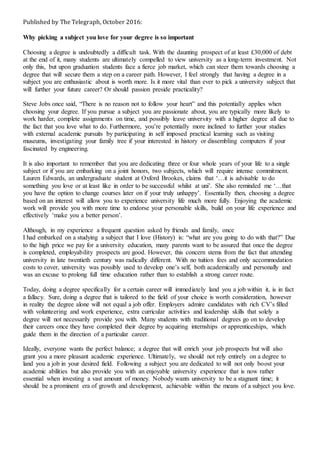
the telegraph piece
- 1. Published by The Telegraph, October 2016: Why picking a subject you love for your degree is so important Choosing a degree is undoubtedly a difficult task. With the daunting prospect of at least £30,000 of debt at the end of it, many students are ultimately compelled to view university as a long-term investment. Not only this, but upon graduation students face a fierce job market, which can steer them towards choosing a degree that will secure them a step on a career path. However, I feel strongly that having a degree in a subject you are enthusiastic about is worth more. Is it more vital than ever to pick a university subject that will further your future career? Or should passion preside practicality? Steve Jobs once said, “There is no reason not to follow your heart” and this potentially applies when choosing your degree. If you pursue a subject you are passionate about, you are typically more likely to work harder, complete assignments on time, and possibly leave university with a higher degree all due to the fact that you love what to do. Furthermore, you’re potentially more inclined to further your studies with external academic pursuits by participating in self imposed practical learning such as visiting museums, investigating your family tree if your interested in history or dissembling computers if your fascinated by engineering. It is also important to remember that you are dedicating three or four whole years of your life to a single subject or if you are embarking on a joint honors, two subjects, which will require intense commitment. Lauren Edwards, an undergraduate student at Oxford Brookes, claims that ‘…it is advisable to do something you love or at least like in order to be successful whilst at uni’. She also reminded me ‘…that you have the option to change courses later on if your truly unhappy’. Essentially then, choosing a degree based on an interest will allow you to experience university life much more fully. Enjoying the academic work will provide you with more time to endorse your personable skills, build on your life experience and effectively ‘make you a better person’. Although, in my experience a frequent question asked by friends and family, once I had embarked on a studying a subject that I love (History) is: “what are you going to do with that?” Due to the high price we pay for a university education, many parents want to be assured that once the degree is completed, employability prospects are good. However, this concern stems from the fact that attending university in late twentieth century was radically different. With no tuition fees and only accommodation costs to cover, university was possibly used to develop one’s self, both academically and personally and was an excuse to prolong full time education rather than to establish a strong career route. Today, doing a degree specifically for a certain career will immediately land you a job within it, is in fact a fallacy. Sure, doing a degree that is tailored to the field of your choice is worth consideration, however in reality the degree alone will not equal a job offer. Employers admire candidates with rich CV’s filled with volunteering and work experience, extra curricular activities and leadership skills that solely a degree will not necessarily provide you with. Many students with traditional degrees go on to develop their careers once they have completed their degree by acquiring internships or apprenticeships, which guide them in the direction of a particular career. Ideally, everyone wants the perfect balance; a degree that will enrich your job prospects but will also grant you a more pleasant academic experience. Ultimately, we should not rely entirely on a degree to land you a job in your desired field. Following a subject you are dedicated to will not only boost your academic abilities but also provide you with an enjoyable university experience that is now rather essential when investing a vast amount of money. Nobody wants university to be a stagnant time; it should be a prominent era of growth and development, achievable within the means of a subject you love.